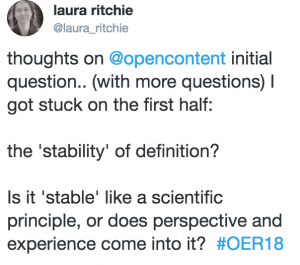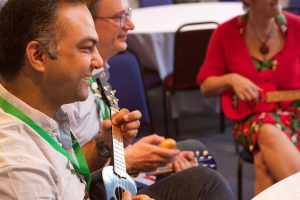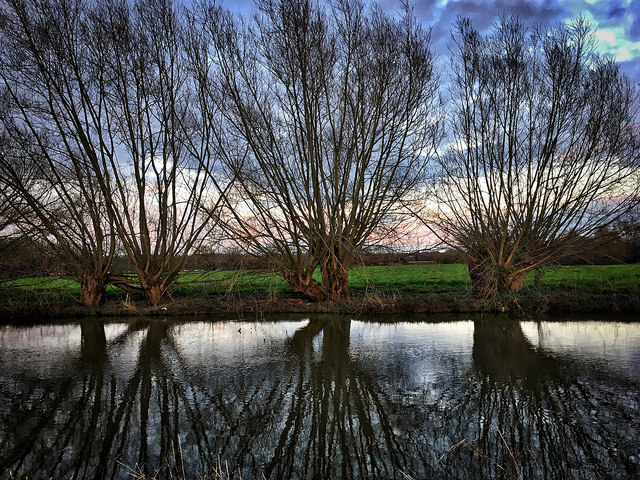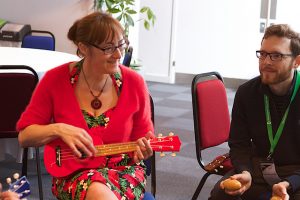This morning at OER, I typed as I listened to the keynote. David Wiley started with definitions. (featured image CC-0 by Alan Levine)
I have a tricky time understanding the labels. Names go with identity, and that is very important, but … I tweeted that I got stuck at the first half of his first question. Not that there was anything wrong with it, but if you’re talking definitions, that means semantics comes into it, and well that is a sort of provocation for me.
An analogy- I realise it is very extreme, and draws a simple connection where there are really a dozen steps, but it illustrates a point- We learn. People, providers, researchers, all like to label the learning. We breathe, and we don’t really talk about it because it is natural to breathe – we all do it. People do discuss air, but generally they label the air when there is something wrong with it- like pollution… If we label the air because it’s broken, does that mean we feel the need to label learning because it’s broken too? Perhaps.
I think many people learn inside of their labelled boxes. How did it get into this boxed state that we have to label the stages of opening the lid. Are we backwards in learning? or just looking at learning backwards?
The seeming desire for so many boxes across education is something that baffles me.
Perhaps we need to shift our perspective. (I’m gently referring to everyone with that we, myself included. For example, how comfy were people sitting in rows and listening to lecture after lecture? Ask yourself where you sit on that spectrum. I am realising more and more that I am past left field. You can probably find me digging and planting that field- metaphorically.)
I remind myself that people who put us in boxes, -sometimes others and sometimes we do it to ourselves – and it is not necessary that we are in boxes, or rows, or even chairs in order to learn. The labels, the definitions help us to understand and when well chosen, they help us to communicate and discuss with one another, but we don’t need them to learn or to teach.
When I met David yesterday (Wednesday) I asked him how does he feel about the imposed walls/rules around open. (he said whatever I asked wouldn’t be related to the topic of his talk, but I think this was) His initial answer had to do with how he talks to people who have never heard of OER and what he said was along the lines of (paraphrasing) – he gets people to use/do something first without calling it OER, and then people are more willing to adopt and accept, to come to the concept without baggage.
I explained that I do the same with music – I facilitate learning by showing and enabling people to do it, whatever ‘it’ is, and then I show them that they are using it- and they find it very hard to refute either their capabilities – as they have done it.
What I was really asking was more about the walls for those who already know about open as a concept. We talked more, and I appreciated the time taken to genuinely discuss with me. I was a stranger after all.
Fast forward to this morning’s workshop at 11am.
It was time for the workshop I was to co-deliver with my students: The sound of an emerging network. I was setting up the room in the break and there were lots of people around. When it came time to start we were left with a cozy group of 8 participants. Each of them was wonderful and they all did love it. Did the description with music in the content scare people off I wonder or was it just the extremely good other sessions? (these photos were all taken by Alan Levine CC-0)
The plan for the session included outlining aspects of how a community forms, giving a bit of my teaching theory to start- and using our recent student-led trip to Los Angeles as a practical linking example.

I could tie in all the elements of planning, goal setting, using and developing skills, and the pattern of introducing and realising co-creation with students. I did a few slides (I though people would like slides, and also I thought it would help to have theoretical things written down for anyone who did not speak English as their first language) and then my students taught the participants a battery of skills on the ukulele. (We brought 30 with us for the session) Slides are embedded at the bottom of this post.
Next groups were set the task of making a song. I gave them a general outline of various possibilities that included using or reusing aspects of what they had just learned… they were not pushed out of the nest without wings, but if the baby bird has not yet flown, sometimes they don’t realise they actually have wings. This scary feeling was felt by some in the room.
As they worked, we (my students and I) walked around, joined in and occasionally contributed a comment or two. At one point I asked one group if everyone was involved? And why not? Who took the lead? If everyone had the skills and the tools, what was stopping participation? Interesting discussions followed. One person blogged about it:
Today I have one major highlight, having experienced the teaching of Laura Ritchie and her amazing students. Laura is an exceptional educator – she introduces an element of meta to all her work, and practice – but in such a light-touch way.And I learned a little bit about playing the Ukulele – and thought a great deal about group practices, and left with a lot more to think about, about my own patterns of behaviour in risk-taking group situations (for the record, I probably play it safe too much and am too quick to respond to a dominant voice. In a time-constrained situation this means I wait too long to have my own voice heard). Sarah-Jane Crowson
Well… there is a whole giant human side to life and learning that is more than resources. We have to understand people to work together. In a community there are different roles, different skills, different needs, and different goals. I will only ever know a small part of any of my students, and somehow I need not only to provide them with skills and tools, but also an open mindset for working. Open for me goes beyond the label. (yes, we need words, and I do love them, but there is so much more than I could convey in just these words.)
David made a point in his morning keynote about humility, saying we do not know how someone else might use, adapt, explore, and grow what any of  us make. Well yes, and especially in today’s consumerist, proprietary culture, we need to be reminded of this. But. Let me add that we do not know how someone will internalise our teaching, how it will speak to them at that moment in their life and learning, and allowing for (I’m struggling for a word here…) flexibility, fluidity, perspective that comes with each individual’s experience is something I personally need to have in my teaching. I hope I achieved that today.
us make. Well yes, and especially in today’s consumerist, proprietary culture, we need to be reminded of this. But. Let me add that we do not know how someone will internalise our teaching, how it will speak to them at that moment in their life and learning, and allowing for (I’m struggling for a word here…) flexibility, fluidity, perspective that comes with each individual’s experience is something I personally need to have in my teaching. I hope I achieved that today.
If you missed the workshop and are curious about what we did, you can see it here: (when I figure out how to upload slides somewhere open, I’ll add those!)
The final performances start at 35 min in the video. The performances are fab. Thank you to everyone who participated and to all who commented at the end. Those last 15 mins (from the performances to the end) are especially worth listening to. The reflections are golden.
After the session my co-presenters and I participated in a V-Connecting session and that was a chance for the students to share their reflections. What a rich experience! Thank you so much to the V-Connecting team for inviting us. 🙂


Pingback: In Essence, what are you comfortable with….. – Thomas Steele-Maley
Thanks for sharing all of this …